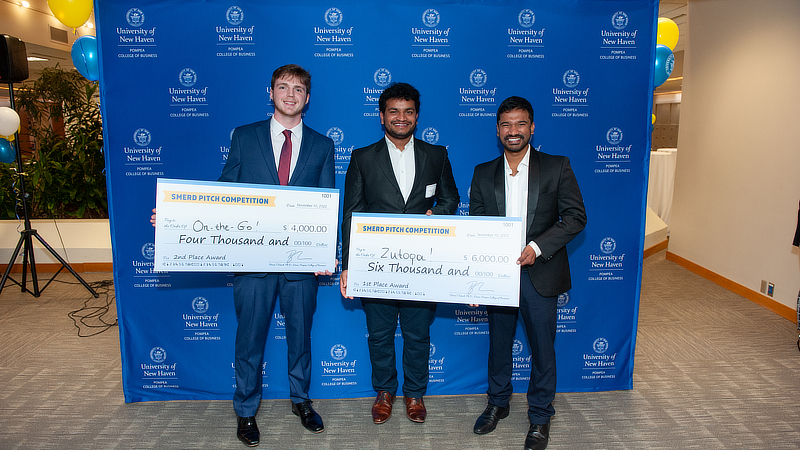Cultivating Tomorrow’s Innovators: UConn’s Entrepreneurship Fellowship Program
As the landscape of technology and innovation continues to evolve, the need for entrepreneurial leaders in STEM (Science, Technology, Engineering, and Mathematics) fields has never been more pressing. Recognizing this imperative, the University of Connecticut’s College of Engineering (CoE) has launched an ambitious initiative: the Entrepreneurship Fellowship Program. Spearheaded by Leila Daneshmandi, the director of the Matthew & Margarethe Mashikian Innovation & Entrepreneurship Hub (eHub), this program is designed to equip graduate students with the skills necessary to navigate the complexities of entrepreneurship in a rapidly changing world.
A Vision for Entrepreneurial Growth
The Entrepreneurship Fellowship Program is a response to the growing demand for interdisciplinary skills in the workforce. Funded by a three-year National Science Foundation (NSF) Innovations in Graduate Education (IGE) grant, the program aims to cultivate a new generation of entrepreneurial STEM leaders who are prepared to tackle real-world challenges through innovation.
Daneshmandi emphasizes the importance of this initiative: “Our graduate students are highly technically capable. This program is designed to broaden their outlook by equipping them with interdisciplinary entrepreneurial skills and preparing them to be entrepreneurially minded leaders, critical and creative thinkers, effective communicators, and resilient individuals who can learn from setbacks.”
Program Structure and Curriculum
The Entrepreneurship Fellowship Program unfolds over an academic year, structured into three consecutive modules that combine curricular and co-curricular activities. Open to all UConn doctoral or master’s students in STEM fields, the program requires no prior entrepreneurial experience, making it accessible to a diverse range of participants.
Fellows engage in comprehensive training that covers essential topics such as opportunity recognition, design thinking, customer discovery, leadership, and the commercialization of research and technology. Additionally, participants have access to prototyping grants to advance their innovations and travel funds to attend entrepreneurship events and pitch competitions. These opportunities allow fellows to network with mentors, investors, and other key players in the innovation ecosystem.
Real-World Impact and Success Stories
The inaugural cohort of the Entrepreneurship Fellowship Program has already made significant strides. Comprising ten fellows from various disciplines, they have developed seven distinct entrepreneurial ventures and garnered recognition at prestigious venues, including the 2025 ARPA-E Energy Innovation Summit Program and the AI Safety Entrepreneurship Hackathon.
Adaeze Maduako, one of the fellows, reflects on her transformative experience: “The program was incredibly transformative and instrumental to my personal and professional growth. I gained a comprehensive understanding of the entrepreneurial process, from ideation and market validation to securing funding across the different stages of a start-up’s lifecycle.” Maduako highlights the collaborative environment fostered by the cohort model, where students could share insights and build lasting connections.
Leadership and Collaborative Efforts
The program is not only a collaborative effort among students but also among faculty and industry leaders. Daneshmandi leads a team that includes Andri Christodoulidou, visiting assistant professor and director of Impact Assessment at the Vergnano Institute for Inclusion; Leslie Shor, vice provost for Graduate Education and dean of the UConn Graduate School; and Zheni Wang, associate professor of Management at Southern Connecticut State University. Together, they aim to cultivate a campus-wide culture of entrepreneurship and train STEM students in essential entrepreneurial competencies.
Long-Term Goals and Future Aspirations
In the short term, the program seeks to instill a culture of entrepreneurship across the UConn campus. Long-term goals include gathering data to assess the program’s effectiveness, scaling the initiative, and evaluating its impact on students’ professional trajectories and mindsets. Daneshmandi envisions a future where interdisciplinary STEM training goes hand-in-hand with leadership, impact, and innovation.
“We’re equipping students to not only become technical experts but bold, thoughtful innovators,” she states, underscoring the program’s commitment to fostering a new generation of leaders.
Join the Movement
Applications for the next cohort of the Entrepreneurship Fellowship Program are currently open, with a deadline of July 31. Interested students can find more information on the eHub website.
The first cohort of Entrepreneurship Fellows includes graduate students from a broad range of disciplines, such as:
Fatma Elshinshiny, Biomedical Engineering
Nooshin Farashaei, Digital Media and Design
Md Zakir Hossain, Computer Science and Engineering
Md Safaet Hossain Sujan, Health Promotion Sciences
Aidan Kierans, Computer Science and Engineering
Adaeze Maduako, Chemical Engineering
Nicholas Nguyen, Mechanical Engineering
Mohammad Osat, Chemical & Biomolecular Engineering
Alaa Salim, Electrical and Computer Engineering
Soroush Vahedi, Electrical Engineering
Conclusion
The Entrepreneurship Fellowship Program at UConn is more than just an educational initiative; it is a movement aimed at shaping the future of innovation and entrepreneurship in STEM fields. By providing students with the tools, resources, and networks they need to succeed, UConn is not only preparing them for their careers but also empowering them to become the next generation of leaders who will drive change and innovation in our society.




















